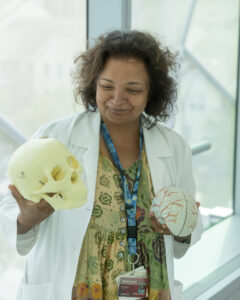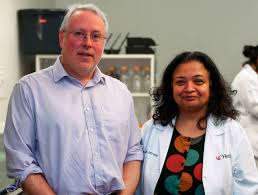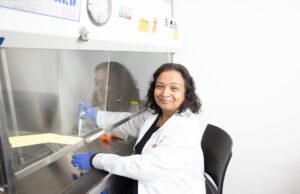Dr. Soma Sengupta, MD, PhD, MBA, FRCP, FANA, FAAN, has joined UNC Health’s Departments of Neurology and Neurosurgery. Dr. Sengupta is a board-certified neurologist, a fellowship-trained, sub-specialty board-certified neuro-oncologist, and is fellowship-trained in integrative medicine. She is a physician-scientist, clinical trialist specializing in brain tumor treatment and research with over 80 publications on clinical trials, case reports, lab-based research, and healthcare policy.
Neurosurgery. Dr. Sengupta is a board-certified neurologist, a fellowship-trained, sub-specialty board-certified neuro-oncologist, and is fellowship-trained in integrative medicine. She is a physician-scientist, clinical trialist specializing in brain tumor treatment and research with over 80 publications on clinical trials, case reports, lab-based research, and healthcare policy.
Dr. Sengupta has joined the Departments of Neurology and UNC Health as a Professor, Division Chief of Neuro-oncology, and a Vice Chair in Neurology. She will set up her brain tumor lab on the UNC-Chapel Hill campus. She will work alongside her husband, Dr. Daniel Pomeranz Krummel, Ph.D., a biochemist by training and protégé of Nobel laureate Sidney Altman from Yale University. He will join the UNC Neurosurgery faculty as an Associate Professor.
Medicine is in Dr. Sengupta’s DNA. She spent formative periods of her life in different parts of the world, including India and Africa, moving frequently for her father’s job as a physician whose interest was in establishing clinics in underserved areas. Her most formative years were spent in the United Kingdom. She completed her bachelor’s degree in biochemistry at the University of Wales, a doctoral degree in biochemistry at the University of Cambridge, and a medical degree at the University of Cambridge. An encounter with a childhood friend who succumbed to a pediatric brain tumor was a catalyst in Dr. Sengupta’s interest in the neurosciences.

After completing her Ph.D. at Cambridge, Dr. Sengupta came to the United States to complete a post-doc at Yale University. She was mentored by Sterling Professor Carolyn Slayman, a protégé of Nobel laureate Dr. Edward Tatum and the Deputy Dean of Yale Medicine at the time. She asked Dr. Sengupta why she had not completed training in medicine. Dr. Sengupta told her that she wanted to work at the bench. Dr. Slayman reassured her that she could be a scientist, physician, and more. She took this sage advice and returned to her alma mater, Cambridge, to complete her medical degree. During her training, she was interested in neurology and neurosurgery, specifically treating epilepsy, stroke, and neuro-infectious diseases. Ultimately, neuro-oncology became Dr. Sengupta’s calling. “It is not a field with an algorithm,” said Dr. Sengupta. “We still do not have the perfect system to improve the survival of patients. We are trying to understand the biology and help the patients live a longer and more meaningful life.”
During medical training, Dr. Sengupta went out of her way to stay active in research and obtain diverse training, which included immunology research at the Cambridge Institute of Medical Research, research at Johns Hopkins, and pediatric brain tumor research at Boston Children’s Hospital. All these experiences focused on how a cell senses and communicates with the “outside world” through the transport of ions and metabolites of various sorts.
 Dr. Sengupta decided to return to the United States with her husband. This move did not come without some headaches since she had to retrain in the U.S. in neurology to be able to practice. She completed a neurology residency at Beth Israel Deaconess Medical Center-Harvard, and a clinical fellowship in neuro-oncology at Dana-Farber Cancer Institute/Brigham and Women’s/MGH. Most recently, she completed a second fellowship in Integrative Medicine at the Andrew Well Center at the University of Arizona. On top of all this, she is about to complete an MBA with a healthcare focus, and is pursuing an executive leadership in healthcare fellowship.
Dr. Sengupta decided to return to the United States with her husband. This move did not come without some headaches since she had to retrain in the U.S. in neurology to be able to practice. She completed a neurology residency at Beth Israel Deaconess Medical Center-Harvard, and a clinical fellowship in neuro-oncology at Dana-Farber Cancer Institute/Brigham and Women’s/MGH. Most recently, she completed a second fellowship in Integrative Medicine at the Andrew Well Center at the University of Arizona. On top of all this, she is about to complete an MBA with a healthcare focus, and is pursuing an executive leadership in healthcare fellowship.
Dr. Sengupta’s first faculty appointment was as an instructor in the Department of Neurology at Beth Israel Deaconess Medical Center. The opportunity to actively collaborate with her husband, and more effectively manage their two daughters, took them to Emory University. Little did she know, her time at Emory would play into a future decision. At Emory, she first crossed paths with Dr. Nelson Oyesiku, now chair of the Department of Neurosurgery at UNC Health. Dr. Sengupta worked with Dr. Oyesiku during her time at Emory and described him as an “exceptionally caring and talented neurosurgeon,” stating that “Dr. Oyesiku is one of my favorite neurosurgeons that I have ever worked with.” When he called her about his planned move and interest in building neuro-oncology at UNC, it was difficult for her to say no.
Medical Center. The opportunity to actively collaborate with her husband, and more effectively manage their two daughters, took them to Emory University. Little did she know, her time at Emory would play into a future decision. At Emory, she first crossed paths with Dr. Nelson Oyesiku, now chair of the Department of Neurosurgery at UNC Health. Dr. Sengupta worked with Dr. Oyesiku during her time at Emory and described him as an “exceptionally caring and talented neurosurgeon,” stating that “Dr. Oyesiku is one of my favorite neurosurgeons that I have ever worked with.” When he called her about his planned move and interest in building neuro-oncology at UNC, it was difficult for her to say no.
When she got that call, she was the Harold C. Schott Endowed Chair of Molecular Therapeutics, Associate Director of the University of Cincinnati Gardner Neuroscience Institute Brain Tumor Center, and Division of Neuro-Oncology.
Dr. Sengupta’s primary area of lab-based research will be to improve patient outcomes for brain tumor patients. This includes individuals with primary brain tumors as well as metastatic brain tumors. Since her time in Boston, she has explored how to target a specific ion channel and discovered a new class of drugs to do so. At UNC, she looks forward to collaborating and working alongside other like-minded scientists and physicians at the UNC Cancer Center. “It is a nice collegiate group of people that have the same goals to help brain tumor patients and further the research in the brain tumor sphere,” said Dr. Sengupta. “All of us are interested in patient-centric care with innovation and furthering the cancer center’s research mission.”
Dr. Sengupta’s research also includes advancing technologies that have the potential to impact patient care. Most recently, she has collaborated to advance focused ultrasound. Dr. Vibhor Krishna is pursuing this technology at UNC to treat patients with movement disorders. Dr. Sengupta also co-founded a corporation with her husband and a chemist at the University of Wisconsin.
Dr. Sengupta will also work closely with Dr. Yasmeen Rauf and Dr. Dominique Higgins on brain tumor clinical trials at UNC Health. As a clinical trialist, she enjoys designing clinical trials and will be active with colleagues at UNC Health and researchers from all over the United States. Dr. Sengupta serves on various clinical committees that impact patient care, including the NRG Oncology Committee. Locally, she will be a member of the UNC multidisciplinary neuro-oncology clinic, collaborating on caring for brain tumor patients.
Dr. Sengupta is passionate about paving the way for other women. “As a woman, it is essential to me to be a role model to my two daughters, to show them that anything is possible, and to pave the way for other women out there.” Dr. Sengupta would like to use her MBA training to better understand how different healthcare systems work. “I am interested in how processes and things evolve.” Her interest in this area grew during the pandemic, noticing the problems that arose in the healthcare system. She authored multiple publications on the neurological complications due to Covid-19.
Dr. Soma Sengupta has received many awards during her career. However, she is most thrilled by being selected for the Leonard Tow Humanism in Medicine Award presented by the Arnold P Gold Foundation. Recipients of the award are nominated by their colleagues and patients, and patient family members. She feels that this is one that her father, if he were still alive, would have most cherished.
When asked about her goals for the next ten years of her career, Dr. Sengupta said that she hopes to build the neuro-oncology program at UNC Health into a model center that treats the “whole patient”, is highly collaborative, and provides care for all North Carolinians. “I would like to network the hospitals belonging to UNC so that the greater community in N.C. can benefit from the trials,” said Dr. Sengupta. “I would also like to expand collaboration with other groups in North Carolina. There are some fabulous neuro-oncologists in N.C., and I would like to form a robust network that provides the best care for our patients.”
Written by: Makenzie Hardy, Marketing Coordinator, UNC Health Department of Neurosurgery